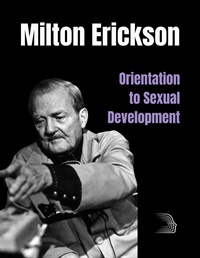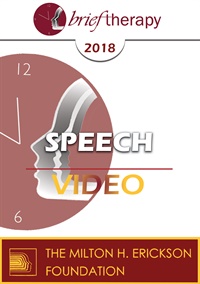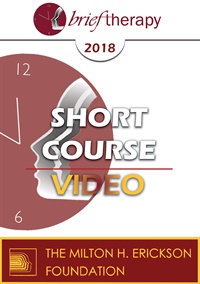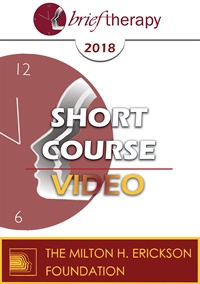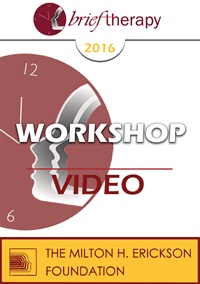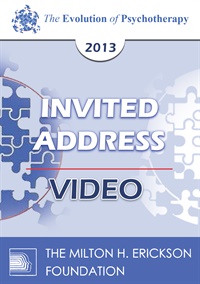This program is not available for credit.
- Average Rating:
- Not yet rated
- Topic Areas:
- Sex and Sexuality | Ericksonian Hypnosis and Therapy Techniques | Milton Erickson | Couples Therapy | Children and Adolescent Therapy | Humor | Hypnosis
- Categories:
- Erickson Materials | Erickson Streaming Video Collection | Milton H. Erickson Collections
- Faculty:
- Jeffrey Zeig, PhD | Milton H. Erickson, MD
- Course Levels:
- Master Degree or Higher in Health-Related Field
- Duration:
- 1 hour
- Format:
- Audio and Video
- Original Program Date:
- Jul 07, 2020
- Short Description:
- In this video, Dr. Milton Erickson describes sexual development — from infancy to adulthood, with a focus on male sexual maturation. As Erickson’s describes sexual development, the viewer feels as if they are going through the process as well. Erickson also includes humorous anecdotes of his children as they grew into adults. At the end of the video Dr. Jeffrey Zeig comments on Erickson’s fascinating teaching methods and communication techniques.
- Price:
- $19.95 - Base Price
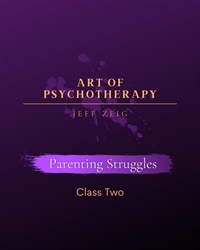
- Average Rating:
- Not yet rated
- Topic Areas:
- Utilization | Clinical Demonstrations | Psychotherapy | Therapist Development | Children and Adolescent Therapy | Interviewing | Relationships | Therapeutic Relationship
- Bundle(s):
- Art of Psychotherapy - Utilization Series
- Categories:
- Art of Psychotherapy
- Faculty:
- Jeffrey Zeig, PhD
- Course Levels:
- Master Degree or Higher in Health-Related Field
- Duration:
- 2 Hours 18 Minutes
- Format:
- Audio and Video
- Original Program Date:
- Jun 28, 2020
- Short Description:
- Demonstration subject Mette is struggling with issues trying to feel an emotional connection to her children. She describes her difficulty with being present for her children, and is looking for guidance. Dr. Zeig exhibits a few simple techniques that help create a powerful therapeutic relationship quickly, through the use of gestures and strategic interview questions. Dr. Zeig is able to utilize this information to create useful suggestions to help Mette with her situation.
- Price:
- $79.00 - Base Price
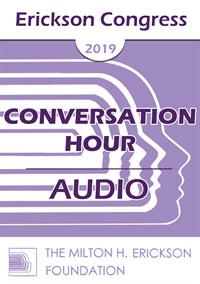
- Average Rating:
- Not yet rated
- Topic Areas:
- Conversation Hours | Anxiety | Children and Adolescent Therapy
- Categories:
- Erickson Congress | Erickson Congress 2019
- Faculty:
- Lynn Lyons, LICSW
- Duration:
- 1 Hour
- Format:
- Audio Only
- Original Program Date:
- Dec 14, 2019
- Short Description:
- Many clinicians focus on breathing, calming, or other distraction techniques when dealing with anxious children. However, focusing on "getting rid of the worry" often backfires, and leaves children and teens feeling more hopeless than engaged. But, when we use short "relaxation" practices with children to shift their patterns and beliefs--when we use this time of focus to deliver and seed valuable information--we create great opportunities for change, engagement, and skill-building. In this hour, I'll describe the tricks to getting the most out these exercises, without stepping into the trap of elimination.
- Price:
- $15.00 - Base Price
Tags: Adolescents Anxiety Children
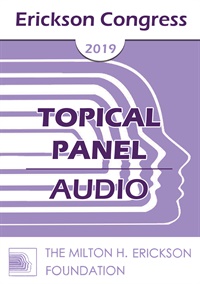
- Average Rating:
- Not yet rated
- Topic Areas:
- Topical Panels | Children and Adolescent Therapy
- Categories:
- Erickson Congress | Erickson Congress 2019
- Faculty:
- Tobi Goldfus, LCSW | Lynn Lyons, LICSW | Joyce Mills, PhD, LMFT | Susy Signer-Fischer, Lic. Phil. Psych
- Duration:
- 1 Hour 3 Minutes
- Format:
- Audio Only
- Original Program Date:
- Dec 13, 2019
- Short Description:
- The panelist will compare and contrast their approaches to working with children and adolescents. Fundamental principles will be offered. Relevant research will be outlined.
- Price:
- $15.00 - Base Price
Tags: Adolescents Children
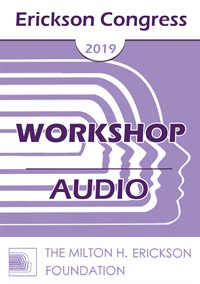
- Average Rating:
- Not yet rated
- Topic Areas:
- Workshops | Children and Adolescent Therapy | Hypnosis
- Categories:
- Erickson Congress | Erickson Congress 2019
- Faculty:
- Susy Signer-Fischer, Lic. Phil. Psych
- Duration:
- 1 Hour 58 Minutes
- Format:
- Audio Only
- Original Program Date:
- Dec 13, 2019
- Short Description:
- Self-efficacy is an essential topic throughout life. Even babies like to control their environment, for example by moving a mobile by a wire attached to their foot. During school years and later on self-efficacy is very important. The contrary is helplessness, the opposite, which can lead to hopelessness and depression. While in certain situations we are able to influence our environment (or processes) directly, such as learning harder in order to get better math marks, this is not always possible.
- Price:
- $15.00 - Base Price
Tags: Adolescents Children Hypnosis
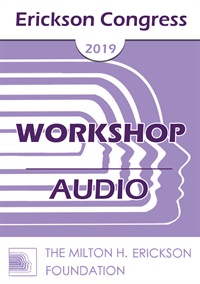
- Average Rating:
- Not yet rated
- Topic Areas:
- Workshops | Autism | Hypnosis | Children and Adolescent Therapy | Family Therapy | Communication
- Categories:
- Erickson Congress | Erickson Congress 2019
- Faculty:
- Laurence Sugarman, MD
- Duration:
- 1 Hour 38 Minutes
- Format:
- Audio Only
- Original Program Date:
- Dec 13, 2019
- Short Description:
- Hypnotic conversations explore, evoke, engage and reallocate and experiential resources. Having hypnotic conversations with young people who meet criteria for autism spectrum disorder (ASD), presents challenges both in relating and accessing resources. The challenge extends to helping their parents to better parent by seeing them as resourceful and capable.
- Price:
- $15.00 - Base Price
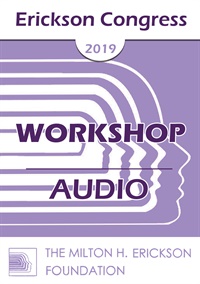
- Average Rating:
- Not yet rated
- Topic Areas:
- Workshops | Anxiety | Family Therapy | Homework | Children and Adolescent Therapy | Experiential Therapy
- Categories:
- Erickson Congress | Erickson Congress 2019
- Faculty:
- Lynn Lyons, LICSW
- Duration:
- 1 Hour 56 Minutes
- Format:
- Audio Only
- Original Program Date:
- Dec 13, 2019
- Short Description:
- After decades of working with anxious children and teens, I have two unshakable truths: families MUST be involved in treatment and anxious patterns are shifted through experiential learning. Working with the FOUR critical concepts to manage anxiety in families and the SIX patterns that must be interrupted, this workshop will describe HOW to create active, engaging assignments for families to do between sessions and describe the TEN favorites that I return to again and again.
- Price:
- $15.00 - Base Price
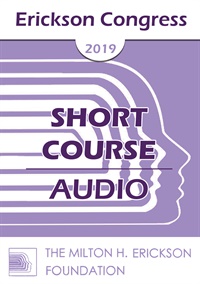
- Average Rating:
- Not yet rated
- Topic Areas:
- Short Courses | Anxiety | Depression | Ericksonian Hypnosis and Therapy Techniques | Children and Adolescent Therapy | Eye Movement Desensitization and Reprocessing (EMDR) | Hypnosis | Cognitive Behavior Therapy (CBT)
- Categories:
- Erickson Congress | Erickson Congress 2019
- Faculty:
- Joseph Sestito, MSSA, LISW-S
- Duration:
- 1 Hour 33 Minutes
- Format:
- Audio Only
- Original Program Date:
- Dec 12, 2019
- Short Description:
- The first factor that is of central importance is developing a strong therapeutic alliance with the client, mainly through empathically relating to him/her. Second, it will be shown how to guide adolescents and younger children to identify the specific Activating Event (AE) that is bringing about their unhealthy negative emotions through triggering self-defeating cognition(s).
- Price:
- $15.00 - Base Price
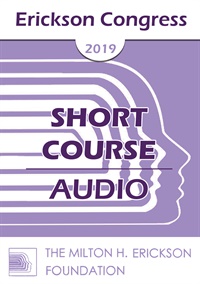
- Average Rating:
- Not yet rated
- Topic Areas:
- Short Courses | Children and Adolescent Therapy | Ericksonian Psychotherapy | Psychotherapy | Ericksonian Hypnosis and Therapy Techniques | Family Therapy
- Categories:
- Erickson Congress | Erickson Congress 2019
- Faculty:
- Maria Escalante de Smith, MA
- Duration:
- 1 Hour
- Format:
- Audio Only
- Original Program Date:
- Dec 12, 2019
- Short Description:
- Ericksonian Psychotherapy emphasizes the importance of utilization. When treating children, as therapists, we need to keep in mind that we also need to utilize whatever happens during therapy whether that can be a given behavior, if the child brings a toy for the consultation, their likes and also provide them with a wide array of resources they can access during therapy.
- Price:
- $15.00 - Base Price
Credit available - Click Here for more information
- Average Rating:
- Not yet rated
- Topic Areas:
- Speeches | Children and Adolescent Therapy | Art and Creativity | Brief Therapy | Family Therapy | Anxiety | Depression | Goals of the Therapist
- Categories:
- Brief Therapy Conference | Brief Therapy Conference 2018 | Online Continuing Education
- Faculty:
- Lynn Lyons, LICSW
- Course Levels:
- Master Degree or Higher in Health-Related Field
- Duration:
- 1:02:45
- Format:
- Audio and Video
- Original Program Date:
- Dec 09, 2018
- Short Description:
- We don't often think of creativity and problem solving as equal partners in therapy with children. But when struggling families arrive at your office, it is the immediate blending of these two components that allows you and the family to move quickly from overwhelmed to engaged, confused to targeted. Based on 29 years of successes and failures, this speech will offer ideas to immediately connect with families, help them untangle the tired messiness they often arrive with, and create active interventions that build momentum, create new patterns, and offer hope.
- Price:
-
Sale is $29.00
price reduced from Base Price - $59.00
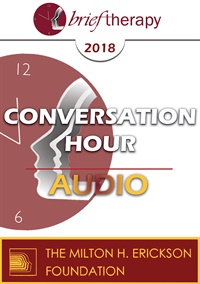
- Average Rating:
- Not yet rated
- Topic Areas:
- Great Conversations | Children and Adolescent Therapy | Family Therapy | Trauma | Brief Therapy | Post-Traumatic Stress Disorder (PTSD)
- Categories:
- Brief Therapy Conference | Brief Therapy Conference 2018
- Faculty:
- Camillo Loriedo, MD, PhD | Lynn Lyons, LICSW
- Duration:
- 1:00:58
- Format:
- Audio Only
- Original Program Date:
- Dec 08, 2018
- Short Description:
- Trauma does not only affect individuals; it effects families. Systemic perspectives on the sequel to trauma will be presented.
- Price:
- $15.00 - Base Price
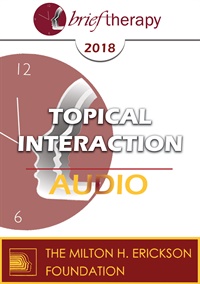
- Average Rating:
- Not yet rated
- Topic Areas:
- Topical Interactions | Anxiety | Brief Therapy | Children and Adolescent Therapy | Community | Depression
- Categories:
- Brief Therapy Conference | Brief Therapy Conference 2018
- Faculty:
- Lynn Lyons, LICSW
- Duration:
- 1:03:32
- Format:
- Audio Only
- Original Program Date:
- Dec 08, 2018
- Short Description:
- Educators are being asked to do more and more to support the emotional wellbeing of students and understand the mental health needs of their students. Programs are consistently being introduced and professional development offered. What's working and what isn't? How much can we expect of teachers and administrators? How is the collaboration and communication between parents, schools, and outside providers going? And what are students actually earning in about their mental health in school?
- Price:
- $15.00 - Base Price
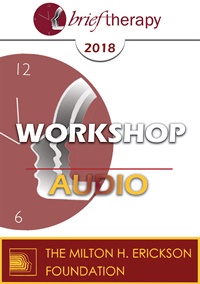
- Average Rating:
- Not yet rated
- Topic Areas:
- Workshops | Anxiety | Brief Therapy | Children and Adolescent Therapy | Depression | Family Therapy
- Categories:
- Brief Therapy Conference | Brief Therapy Conference 2018
- Faculty:
- Lynn Lyons, LICSW
- Duration:
- 2:00:14
- Format:
- Audio Only
- Original Program Date:
- Dec 07, 2018
- Short Description:
- The most frequent complaint I hear from parents about the treatment they receive for their child's anxiety? "No one told us what to DO!" Anxiety is often generational, and by the time a family arrives at your office, they have been in the grips of the cult leader called anxiety for years. Worse yet, many of the things they have been doing, although loving and supportive, are actually making the anxiety stronger. This workshop will describe how to give families immediate and active solutions from the first session, including the use of front loading to provide critical information and understanding, changing the family's relationship with anxiety, and creating active interventions that are often the opposite of what they've typically been doing.
- Price:
- $15.00 - Base Price
Credit available - Click Here for more information
- Average Rating:
- Not yet rated
- Topic Areas:
- Short Courses | Children and Adolescent Therapy | Cognitive Behavior Therapy (CBT) | Hypnosis
- Categories:
- Brief Therapy Conference | Brief Therapy Conference 2018 | Online Continuing Education
- Faculty:
- Jeffrey Lazarus, MD, FAAP
- Course Levels:
- Master Degree or Higher in Health-Related Field
- Duration:
- 1:09:51
- Format:
- Audio and Video
- Original Program Date:
- Dec 06, 2018
- Short Description:
- David Burns, MD, has developed TEAM therapy (Testing, Empathy, Agenda Setting, and Methods), using new tools, including new forms of communication skills that can be applied to any type of therapy (CBT, psychodynamic, hypnosis, etc.), enhancing results and speeding up the process. This is the first time the same model that Dr. Burns has been using and teaching for adults will be shown in working with children and adolescents.
- Price:
-
Sale is $29.00
price reduced from Base Price - $59.00
- Average Rating:
- Not yet rated
- Topic Areas:
- Short Courses | Hypnotherapy | Somatic Experiences | Trauma | Children and Adolescent Therapy | Brief Therapy
- Categories:
- Brief Therapy Conference | Brief Therapy Conference 2018
- Faculty:
- Tobi Goldfus, LCSW
- Course Levels:
- Master Degree or Higher in Health-Related Field
- Duration:
- 1:09:59
- Format:
- Audio and Video
- Original Program Date:
- Dec 06, 2018
- Short Description:
- This workshop will examine the perimeters of cyber trust and cyber sincerity and offer assessment tools such as the Social Media Assessment Form and the Self-Report of Social Media Traumatic Experience Form to move into more informed, attuned and effective positions of intervention.
- Price:
-
Sale is $29.00
price reduced from Base Price - $59.00
Credit available - Click Here for more information
- Average Rating:
- Not yet rated
- Topic Areas:
- Short Courses | Brief Therapy | Children and Adolescent Therapy
- Categories:
- Brief Therapy Conference | Brief Therapy Conference 2018 | Online Continuing Education
- Faculty:
- Susan Pinco, PhD
- Course Levels:
- Master Degree or Higher in Health-Related Field
- Duration:
- 1:31:28
- Format:
- Audio and Video
- Original Program Date:
- Dec 06, 2018
- Short Description:
- Brainspotting is a powerful tool that allows you to circumvent many of the frustrating and challenging issues that frequently impede efforts to help children, teens and adults. By engaging your clients in this active and creative process, Brainspotting allows the counselor and client to work together to amplify the client’s innate ability to heal, grow and change, often with astounding speed.
- Price:
-
Sale is $29.00
price reduced from Base Price - $59.00
- Average Rating:
- Not yet rated
- Topic Areas:
- Anxiety | Depression | Hypnosis | Children and Adolescent Therapy | Workshops | Humor
- Categories:
- Brief Therapy Conference | Brief Therapy Conference 2016
- Faculty:
- Lynn Lyons, LICSW
- Course Levels:
- Master Degree or Higher in Health-Related Field
- Duration:
- 2:47:32
- Format:
- Audio and Video
- Original Program Date:
- Dec 11, 2016
- Short Description:
- Anxiety and depression go hand in hand; untreated anxiety during childhood is a top predictor of depression in adolescents and young adults. This workshop teaches how to interrupt the patterns of anxiety and depression in children, first by recognizing what patterns need to change and then using creative and hypnotic language, homework, humor to actively make shifts happen. Concrete strategies are based on three frames that help simplify and target the patterns so common in anxiety, depression, somatic, and sleep problems.
- Price:
-
Sale is $29.95
price reduced from Base Price - $59.00
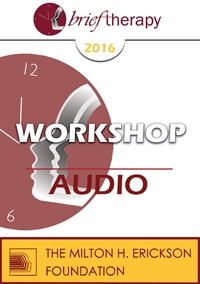
- Average Rating:
- Not yet rated
- Topic Areas:
- Anxiety | Children and Adolescent Therapy | Workshops | Brief Therapy | Family Therapy
- Categories:
- Brief Therapy Conference | Brief Therapy Conference 2016
- Faculty:
- Lynn Lyons, LICSW
- Duration:
- 2:41:37
- Format:
- Audio Only
- Original Program Date:
- Dec 11, 2016
- Short Description:
- When children and their parents are in the grips of worry and stress, it feels overwhelming and mysterious. Anxiety is a very persistent master; when it moves into families, it takes over daily routines, schoolwork, bedtime and recreation. To make matters worse, the things adults (including many therapist and school systems) do to help and console anxious children actually make the anxiety stronger.
- Price:
- $15.00 - Base Price
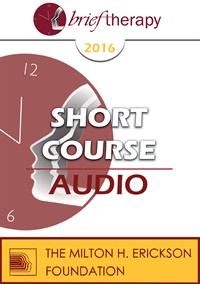
- Average Rating:
- Not yet rated
- Topic Areas:
- Short Courses | Brief Therapy | Children and Adolescent Therapy | Hypnotic Induction | Psychotherapy
- Categories:
- Brief Therapy Conference | Brief Therapy Conference 2016
- Faculty:
- Bette Freedson, MSW
- Duration:
- 1:30:02
- Format:
- Audio Only
- Original Program Date:
- Dec 08, 2016
- Short Description:
- This workshop presents the SOLVE method, a brief 5-step approach to psychotherapy with young clients that effectively orients toward decreased anxiety, increase in number of positive cognitions, enhanced problem solving and enduring behavioral changes. Participants will explore and experience how induction, visualization and didactics empower lasting behavioral and emotional improvement.
- Price:
- $15.00 - Base Price
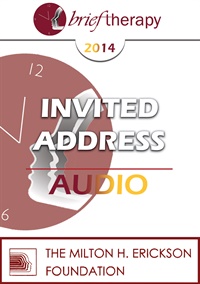
- Average Rating:
- Not yet rated
- Topic Areas:
- Anxiety | Invited Addresses | Brief Therapy | Children and Adolescent Therapy | Homework
- Categories:
- Brief Therapy Conference | Brief Therapy Conference 2014
- Faculty:
- Lynn Lyons, LICSW
- Duration:
- 1:01:55
- Format:
- Audio Only
- Original Program Date:
- Dec 14, 2014
- Short Description:
- When working with anxious kids, your brilliance in the office means nothing if they cannot take what you offer and use it in their world. This presentation will give you eight homework assignments to engage kids from the start, and will spark your strategic creativity as you develop your own homework ideas.
- Price:
- $15.00 - Base Price
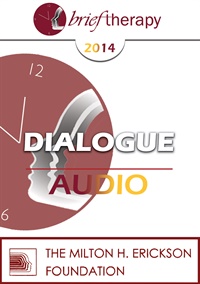
- Average Rating:
- Not yet rated
- Topic Areas:
- Anxiety | Dialogues | Children and Adolescent Therapy | Brief Therapy
- Categories:
- Brief Therapy Conference | Brief Therapy Conference 2014
- Faculty:
- Reid Wilson, PhD | Lynn Lyons, LICSW
- Duration:
- 58:40
- Format:
- Audio Only
- Original Program Date:
- Dec 13, 2014
- Short Description:
- BT14 Dialogue 01 - Anxiety Self Help For Kids - Reid Wilson, PhD and Lynn Lyons, LICSW Educational Objectives: Given a topic, describe the differing approaches to psychotherapy, and identify the strengths and weaknesses of each approach.
- Price:
- $15.00 - Base Price
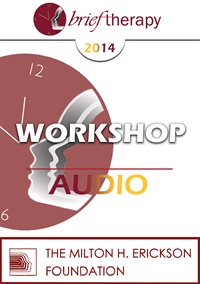
BT14 Workshop 03 - Anxious Kids, Anxious Parents: 7 Ways to Stop the Worry Cycle - Lynn Lyons, LICSW
- Average Rating:
- Not yet rated
- Topic Areas:
- Anxiety | Worry | Workshops | Brief Therapy | Children and Adolescent Therapy
- Categories:
- Brief Therapy Conference | Brief Therapy Conference 2014
- Faculty:
- Lynn Lyons, LICSW
- Duration:
- 1:50:51
- Format:
- Audio Only
- Original Program Date:
- Dec 12, 2014
- Short Description:
- Current research supports the inclusion of both parents and children in the treatment of anxiety in children based on the strong correlation between anxious parents and the subsequent development of anxiety in their children. This workshop will describe seven concrete strategies that teach families to interrupt the worry cycle and its all too common transmission from parent to child.
- Price:
- $15.00 - Base Price
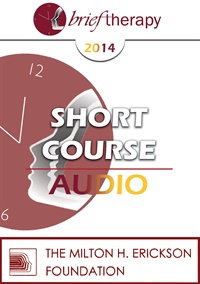
- Average Rating:
- Not yet rated
- Topic Areas:
- Ericksonian Psychotherapy | Psychotherapy | Trauma | Short Courses | Children and Adolescent Therapy | Pain and Healing | Brief Therapy | Ericksonian Hypnosis and Therapy Techniques
- Categories:
- Brief Therapy Conference | Brief Therapy Conference 2014
- Faculty:
- Maria Escalante de Smith, MA
- Duration:
- 1:09:29
- Format:
- Audio Only
- Original Program Date:
- Dec 11, 2014
- Short Description:
- When children experience painful emotions and anxiety after going through traumatic events they may not be able to understand what is happening to them and thus get depressed. Other consequences may appear, like lack of concentration or academic problems. Attendants will learn how treat these conditions by using brief Ericksonian techniques, assignments, and toys and by including the family members during therapy.
- Price:
- $15.00 - Base Price
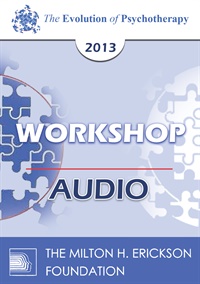
- Average Rating:
- Not yet rated
- Topic Areas:
- Workshops | Children and Adolescent Therapy | Gestalt | Art and Creativity | Psychotherapy
- Categories:
- Evolution of Psychotherapy | Evolution of Psychotherapy 2013
- Faculty:
- Violet Oaklander, PhD
- Duration:
- 2 Hours 16 Minutes
- Format:
- Audio Only
- Original Program Date:
- Dec 14, 2013
- Short Description:
- An approach to working with children and adolescents that involves a variety of projective, creative and expressive techniques with Gestalt Therapy theory, philosophy and practice as the underlying framework. Included will be an overview of the Oaklander model of the therapeutic process, case material, a direct experience, and discussion.
- Price:
- $15.00 - Base Price
- Average Rating:
- Not yet rated
- Topic Areas:
- Invited Addresses | Children and Adolescent Therapy | Neuroscience | Psychotherapy | Reframing
- Categories:
- Evolution of Psychotherapy | Evolution of Psychotherapy 2013
- Faculty:
- Daniel Siegel, MD
- Course Levels:
- Master Degree or Higher in Health-Related Field
- Duration:
- 1:05:53
- Format:
- Audio and Video
- Original Program Date:
- Dec 14, 2013
- Short Description:
- In this invited address, the emerging science of the adolescent period will be explored to reveal that the essence of this important time of life is actually the source of vitality throughout the lifespan. Reframing this view of our teen years and beyond can help shape how adolescents and adult approach this challenging period of growth. Adolescents and adults can benefit from this new, scientifically-informed perspective on this courageous and creative period of our individual and collective lives.
- Price:
-
Sale is $29.00
price reduced from Base Price - $59.00


